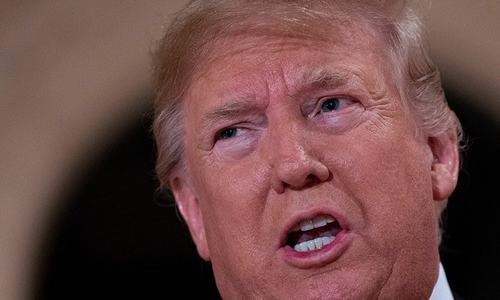
WASHINGTON: Former US presidents George W. Bush and Barack Obama were also offered the option to assassinate Iranian Gen Qassim Soleimani but they “rejected killing him as too provocative,” The New York Times reported on Sunday.
The report did not specify when and why the two former presidents were offered this option, but it did say that Washington has long believed Gen Soleimani was responsible for the deaths of hundreds of American troops in Iraq.
The last time the United States killed a major military leader in a foreign country was during World War II, when the American military shot down the plane carrying the Japanese admiral Isoroku Yamamoto.
The newspaper also reported that US Secretary of State Mike Pompeo and Vice President Mike Pence were two of the most hawkish voices arguing for a strong US response to Iran’s growing influence in Iraq.
According to the NYT report, last week top American military officials prepared a list of possible US actions to stop alleged Iran-led violence in Iraq and assassinating Gen Soleimani was one of the options.
“They didn’t think he would take it. In the wars waged since the Sept 11, 2001, attacks, Pentagon officials have often offered improbable options to presidents to make other possibilities appear more palatable,” the newspaper reported, quoting sources in the Pentagon.
“After initially rejecting the Soleimani option on Dec 28 and authorising air strikes on an Iranian-backed Shia militia group instead, a few days later Mr Trump watched, fuming, as television reports showed Iranian-backed attacks on the American Embassy in Baghdad,” the report added.
“By late Thursday, the president had gone for the extreme option. Top Pentagon officials were stunned.”
NYT noted that Mr Trump made the decision “despite disputes in the administration about the significance” of some intelligence reports that Gen Soleimani was planning fresh attacks in Syria, Lebanon and Iraq.
“Some (US) officials voiced private skepticism about the rationale for a strike on Gen Soleimani,” noting that intelligence about future Iranian attacks on targets inside Iraq was “thin.”
The report noted that communications between Iran’s supreme leader, Ayatollah Ali Khamenei, and Gen Soleimani showed that “the ayatollah had not yet approved any plans by the general for an attack.”
The communications intercepted by the US showed that the “ayatollah had asked Gen Soleimani to come to Tehran for further discussions at least a week before his death.”
Published in Dawn, January 6th, 2020














































